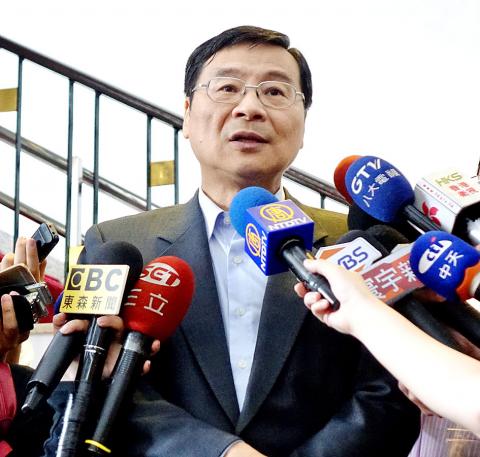Lawmakers yesterday weighed in on the Ministry of Finance’s proposed tax adjustments aimed at making the taxation system more comprehensive and equitable.
The ministry should consider further raising personal income tax “special deductions” from NT$180,000 to NT$200,000 (US$5,969 to US$6,632) to benefit salaried workers, Democratic Progressive Party (DPP) Legislator Wu Ping-jui (吳秉叡) said.
Under the existing rules, workers are eligible for a deduction of NT$128,000 from their yearly salaries. In cases where taxpayers, their spouses or family members hold disability certificates, a further NT$128,000 deduction applies.

Photo: Chien Jung-fong, Taipei Times
Under the proposal, a worker who earns NT$600,000 a year would receive a tax reduction of NT$3,600, a figure that can be increased by further raising special deductions, Wu said.
The plan’s two major changes are the separation of business and income taxes — meaning that dividend income tax payments would be charged separately — and the increase of corporate income tax from 17 percent to 20 percent to compensate for losses arising from the proposed cuts, he said.
The two schemes under consideration would reduce the nation’s annual tax revenue by NT$5.9 billion and NT$6.9 billion respectively, which from a broader perspective does not constitute a large-scale reduction, he said.
Chinese Nationalist Party (KMT) Legislator William Tseng (曾銘宗), a former deputy minister of finance, welcomed the adjustments, but said that deductions could be further increased.
Besides recommending that special deductions be raised to NT$200,000, Tseng also suggested raising the NT$90,000 “standard deductions” from workers’ yearly salaries to NT$150,000, compared with the ministry’s proposal of NT$110,000.
He approved of plans to increase corporate income tax rates and reinstate the 40 percent personal income tax, which he said is “more reasonable” than the current 45 percent.
“The corporate income tax rate is 16.5 percent in Singapore and 17 percent in Hong Kong. Taiwan does not have what it takes to set such a low rate,” Tseng said.
“After the personal income tax rate was raised to 45 percent, many wealthy people renounced their Republic of China citizenship and moved to Hong Kong or Singapore where we could not tax them, which defeats the purpose,” he said.
Tseng also called on the ministry to propose rules to tackle the nation’s underground economy, the market value of which is estimated at about 30 percent of GDP.
If taxed, the black market would add about NT$150 billion to the nation’s annual tax revenue, he said.
The plan favors investors who earn higher dividends, as well as companies that generate higher income, DPP Legislator Wang Jung-chang (王榮璋) said.
He suggested further raising the corporate income tax rate to 21 percent, which would provide an additional NT$21 billion in tax revenue, allowing an increase in deductions for the average worker.
Saying that redistributing tax payments should not cause a reduction in tax revenue, Wang suggested slashing the tax rate on retained earnings from 10 percent to 6 percent, rather than 5 percent as proposed by the ministry.
This would spare about NT$6 billion, which could be used to offset losses arising from the adjustments, Wang said.
Although the legislature has not put the proposal on its agenda, it is likely that the reform is to clear the legislative floor during the current session following alterations, he added.

The manufacture of the remaining 28 M1A2T Abrams tanks Taiwan purchased from the US has recently been completed, and they are expected to be delivered within the next one to two months, a source said yesterday. The Ministry of National Defense is arranging cargo ships to transport the tanks to Taiwan as soon as possible, said the source, who is familiar with the matter. The estimated arrival time ranges from late this month to early next month, the source said. The 28 Abrams tanks make up the third and final batch of a total of 108 tanks, valued at about NT$40.5 billion

Travel agencies in Taiwan are working to secure alternative flights for travelers bound for New Zealand for the Lunar New Year holiday, as Air New Zealand workers are set to strike next week. The airline said that it has confirmed that the planned industrial action by its international wide-body cabin crew would go ahead on Thursday and Friday next week. While the Auckland-based carrier pledged to take reasonable measures to mitigate the impact of the workers’ strike, an Air New Zealand flight arriving at Taipei from Auckland on Thursday and another flight departing from Taipei for Auckland on Saturday would have to

A group from the Taiwanese Designers in Australia association yesterday represented Taiwan at the Midsumma Pride March in Melbourne. The march, held in the St. Kilda suburb, is the city’s largest LGBTQIA+ parade and the flagship event of the annual Midsumma Festival. It attracted more than 45,000 spectators who supported the 400 groups and 10,000 marchers that participated this year, the association said. Taiwanese Designers said they organized a team to march for Taiwan this year, joining politicians, government agencies, professionals and community organizations in showing support for LGBTQIA+ people and diverse communities. As the first country in Asia to legalize same-sex

MOTIVES QUESTIONED The PLA considers Xi’s policies toward Taiwan to be driven by personal considerations rather than military assessment, the Epoch Times reports Chinese President Xi Jinping’s (習近平) latest purge of the Chinese People’s Liberation Army (PLA) leadership might have been prompted by the military’s opposition to plans of invading Taiwan, the Epoch Times said. The Chinese military opposes waging war against Taiwan by a large consensus, putting it at odds with Xi’s vision, the Falun Gong-affiliated daily said in a report on Thursday, citing anonymous sources with insight into the PLA’s inner workings. The opposition is not the opinion of a few generals, but a widely shared view among the PLA cadre, the Epoch Times cited them as saying. “Chinese forces know full well that